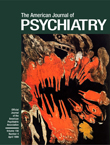To the Editor: In an interesting contribution, Mark S. George, M.D., and colleagues concluded that daily left prefrontal repetitive transcranial magnetic stimulation improved mood in patients with depression, although only one of 12 patients improved more than 50% on the Hamilton Depression Rating Scale. In December 1997, we conducted an open pilot study of repetitive transcranial magnetic stimulation in a group of seven outpatients who had been free of antidepressant medication for at least 2 weeks. All patients were female and ranged in age from 41 to 66 years. Their initial scores on the 17-item Hamilton rating scale ranged from 20 to 29 points. We used a Cadwell rapid-rate stimulator and a Cadwell water-cooled figure-8 coil. Motor threshold was determined, as usual, by use of an electromyogram. We stimulated patients 10 times within a 2-week period, Monday to Friday, at 90% of the motor threshold for 5 seconds at 10 hz for 20 trains, with 1 minute between trains, over the left prefrontal cortex. If after four treatments there was no effect, intensity was raised to 100% of motor threshold. Results were assessed on the Hamilton rating scale on Mondays after the first and second weeks. Of the seven patients, one started antidepressants after 1 week, and two started antidepressants the day after the last treatment. Although we have no Hamilton rating scale scores for these patients after 2 weeks, we conclude that repetitive transcranial magnetic stimulation was unsuccessful in these patients. The average improvement on the Hamilton rating scale for the four patients who completed the study was 5 points, similar to the result of Dr. George and colleagues. Only one patient (F) improved more than 50% on the Hamilton rating scale, with a reduction from 22 to 10 points. One other patient (B) improved more than 25% (from 29 to 21 points). A third patient (D) showed minimal improvement (from 23 to 19 points) but also a remarkable decline in the (ab)use of pain medication, from 16 to three pills (nonsteroidal anti-inflammatory drugs and acetaminophen) daily. She also cut back on smoking, from the first day of repetitive transcranial magnetic stimulation onward. Maybe repetitive transcranial magnetic stimulation has an effect on addictive behaviors. All patients who showed at least minimal response used either no benzodiazepines (D and F) or relatively few (B; alprazolam, 0.125 mg/day). All other patients used higher doses of benzodiazepines. It is possible that benzodiazepines block or obscure the effect of repetitive transcranial magnetic stimulation in depression. A formal study of this aspect seems warranted. Our preliminary conclusion is that a clinically relevant effect of repetitive transcranial magnetic stimulation over the left prefrontal area on depression remains questionable.

